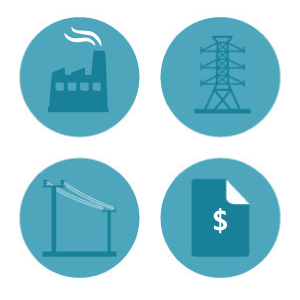Starting Electricity Supply in Massachusetts

Electricity consumers in Massachusetts have had a choice of who supplies their electricity since 1998, when the Massachusetts Electric Industry Restructuring Act came into effect. Are you looking for a cheaper rate for your power? Here we explain everything you need to know about your electricity servicec in Massachusetts!
Looking for Your Utility? List of utilities in Massachusetts
List of agencies in Massachusetts
List of cities in Massachusetts
What Deregulation Means for You
Deregulation of Massachusetts electricity markets means that you can choose what company supplies your electricity. This means:
- Greater choice of energy supplier
- Wider price options - choose a floating price, lock in a fixed price, or choose green energy
- Competition among suppliers, leading to lower prices and better customer service
Learn more about energy market deregulation across the US
What has not changed with deregulation is how electricity is delivered to your home. Your local utility still owns, operates, and maintains the distribution network for electricity, meaning that the power you receive will be the same, regardless of who supplies it. The same thing goes for interruptions or the quality of the electrical current you receive - in short, when you switch suppliers the only thing that changes is the prices!
Choosing a Competitive Supplier in Massachusetts
Comparing Electricity Suppliers Call us at phone currently not available to get up-to-the-minute information on the best deals available in your zipcode and to start your electricity service in minutes
Greater choice and wider energy options can make shopping for energy a big job. Here are some tips to help you get started:
Prices
Deregulation has brought you choice not only in who supplies your electricity, but also what kind of price you pay for it. If you purchase electricity from your utility, you are paying a variable rate that changes every month, and is based on the utility's costs of procuring supply.
However, if you choose to purchase your electricity from a competitive supplier, you have the option of locking in a fixed price. In general, we recommend choosing a fixed price for your electricity if you have the option - find out why.
Competitive Suppliers in Massachusetts
If you're shopping for electricity, it's a good idea to check out the offers of at least four or five competitive suppliers before narrowing down. We also recommend checking out what current customers are saying about electricity suppliers in your area.
Contract Terms and Conditions
There are a few things to look out for when you're reading the terms of your electricity supply contract:
Early Cancellation Fees?
Also known as "early exit fees" or "termination fees", this is a charge for leaving your (usually fixed price) contract before the end of its term.
Automatic Service Renewal
You should always check what your chosen competitive supplier's policy is for when your contract comes to an end. Some competitive suppliers will automatically switch you back to the utility, while others will automatically renew you on a new rate of their choice.
One-Time Charges
It's a good idea to check out how much of a late payment fee your chosen competitive supplier charges, though you should always contact them to see if you can make a special payment arrangement if you cannot pay your bill on time.
Dispute Resolution/Communication
As a general rule, it's a good idea to be aware of the various ways that you can get in touch with your energy supplier.
Find Out More Check out some of our guides to purchasing energy in the US:
Common energy contract terms and conditions
10 questions to ask your supplier
Additional rewards
While rewards such as free thermostats or air miles shouldn't necessarily be your first reason for choosing an energy supplier, they don't hurt either! Competitive suppliers often partner with other companies to offer you additional benefits and rewards, which is something that your utility can't do.
Understand Your Electricity Bills in Massachusetts
Your electricity bill can be broken down into three main types of charges:
- Charges related to your energy supply: covers the cost of the electricity you have consumed over the previous month.
- Charges to cover the costs of transportation: this covers the costs of transmission and distribution along high- and low-voltage wires
- Taxes and state surcharges: these may be flat sums, or variable (based on how much power you have consumed in a month)
How Your Electricity Service Works in Massachusetts
The process of delivering electricity to your home can be broken down into four main steps:
1. Generation

The first step of the process of bringing power to your home is to generate it. In Massachusetts, the electricity generation mix is fairly evenly split amongst nuclear (which provided about 35% of the state's electricity in 2014) and coal (36%), though natural gas is increasingly important as an electricity source in the state.
2. Transmission
As most electricity generation facilities are located in remote areas, power is transported over high-voltage transmission lines to local distribution networks.
3. Distribution
The third step in the process of bringing electricity to your home is when it reaches the local distribution network. At this stage power is transformed into a lower voltage, and travels along local wires to your home.
4. Consumption
The final stage of this process is when energy reaches your home. You are billed for your energy supply by either your utility or your chosen electricity supplier.
Got a question about your power supply in Massachusetts? Call us at phone currently not available to find out the best options for electricity in your area